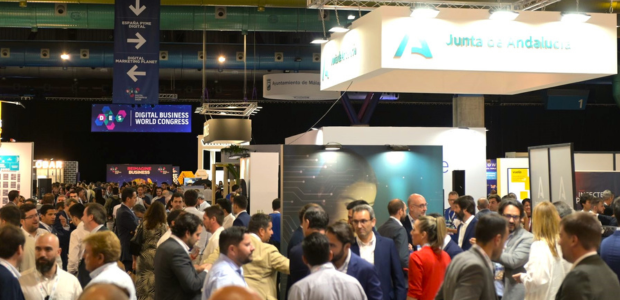
The Artificial Intelligence revolution in jobs: from a risk to an opportunity for better outcomes
Constant digitalisation and changing business models are revolutionising the culture of talent. The emergence of Artificial Intelligence on a global scale, the consolidation of teleworking, or the widespread development of EdTech, or educational technologies, are just some examples of the evolution of human resources. Without going any further, the World Economic Forum has recently pointed out that almost 80% of the most in-demand jobs in 2030 have not yet been created, so the market needs constant training to respond to this development. Added to this is the challenge of a shortage of teams with digital skills and competences.
DES – Digital Enterprise Show, the leading event in digital transformation and disruptive technologies, will once again host the HR Summit in front of more than 16,000 professionals. The forum will analyse, from 13 to 15 June in Malaga, the prioritisation of continuous learning to adapt to a professional environment that evolves every day with the integration of exponential technological tools.
Artificial Intelligence and digital twins enter training
The pandemic has marked a turning point in the development of jobs by fostering technological acceleration. As a result, in recent years, workplaces and learning methods have been reinvented, creating new user experiences fostered by Artificial Intelligence, digital twins, or e-learning platforms. Ricardo Bacchini, Director of People & Organization at Volkswagen; Marta de las Casas, Group People Director at Quirón Salud; and Lina Guerrero, Global Director of Change Programmes at Bupa (Sanitas), will share at DES2023 how they are stimulating innovation and leading change in the different positions of their respective companies.
In turn, Nieves Peño, People Management Director at LaLiga; Enrique Fernández, Head of Talent & Culture at Repsol; Beatriz Vila, Chief People & Sustainability Officer at Ferrer; and Mireia Ranera, HR Digital Transformation Director at the consultancy Incipy, will reflect on the digital transformation projects that are shaping a new paradigm in the workplace.
In the case of AI, this technology influences the way information is sourced and content is created, to the extent that regulations are already being considered to prevent inappropriate use of programmes such as ChatGPT or HeyIA. But how far does AI's influence on talent extend? Edmund Monk, CEO of The Learning and Performance Institute, and one of the leading figures in terms of learning who has promoted numerous plans to train professionals, will address the capabilities and risks that algorithms and digitalisation have on training.
Another of the great transformations that teaching is undergoing is the irruption of the digital twin, which offers possibilities that had not been explored until now. José Manuel Picó, architect and expert in methodologies for innovation, will share his project for the hybridisation of physical and virtual spaces, through the design of digital twins for schools and other academic centres. At the technology summit, the expert will present the initiative being developed at the Torrequebrada International School (Malaga), together with Sonia Díez, the school's principal and president of EducAcción.
"School As A Service" for lifelong learning
The current context marked by continuous learning has meant that the transmission of knowledge is not only limited to a university or school stage, but extends throughout a person's working life, something known as "Life Long Learning". In this sense, the latest technological disruptions have led to workers having to undergo retraining processes in order to remain competitive, a trend that experts say will increase in the coming years. Víctor Moreno, CEO & Co-founder Ynsat, a company that makes satellite technology available to classrooms; Juan Jesús Velasco, VP of Corporate Sector at Genially, an online tool that creates interactive content; Fernando Sierra, CEO of the virtual educational platform, Educa360; and Elena Ibañez, founder of Singularity Experts, a company that offers academic-professional guidance, will analyse how technologies are influencing continuous training and the way in which organisations can take advantage of them.
DES2023 will also be the space where the personalisation of software for talent development and the establishment of platforms and new hardware from which to learn will be explained. Ernesto Plaza, Corporate Talent Manager at Molpack Corporation; Peter Kawalek, Professor and Director of the Centre for Information Management at Loughborough University; and Ricardo Alonso, Founder and CEO of Gnoss, a company dedicated to the construction of semantic websites, will be responsible for sharing what this idea consists of and the possibilities it offers.
Talent Marketplace, the entrepreneurial skills ecosystem
In addition to the congress area, DES2023 will deploy a new edition of the Talent Marketplace, a programme to align the needs of companies in terms of digital talent with the knowledge and skills that students must acquire to respond to these needs. At the same time, the summit will become an ecosystem for professionals to boost their learning and generate skills thanks to the digital products that will be presented to develop their talent. Within this framework, different workshops organised by We Humans will show how to design digital humans or avatars through technology. For its part, Bit2Me will share how to set up a "digital wallet" or create a live NFT.

